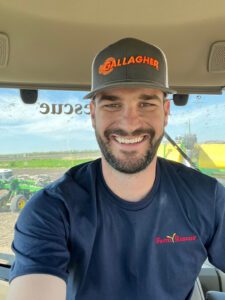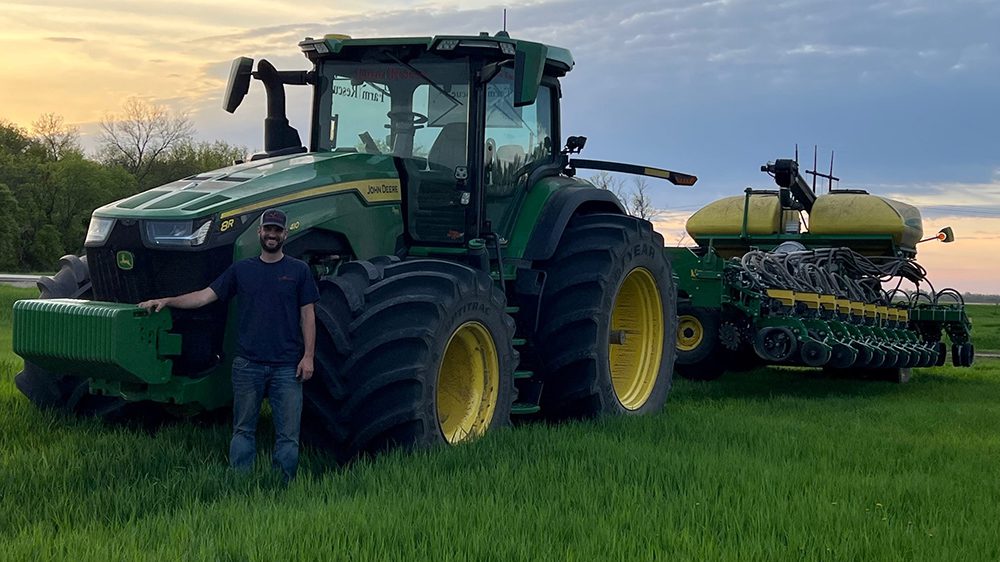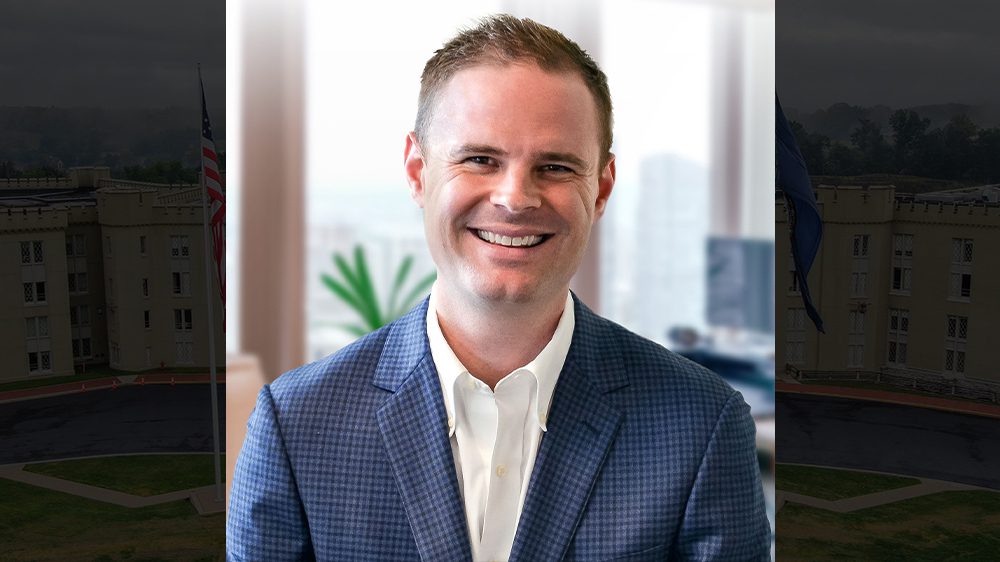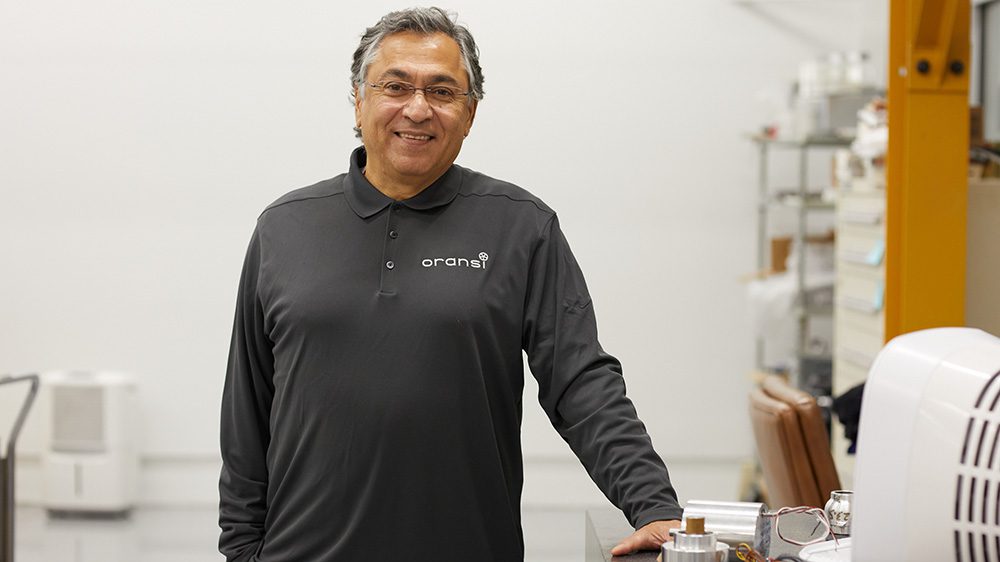Thomas Louderback ’11 first heard about Farm Rescue—a nonprofit organization aiding family farms and ranches during crises—from a friend and immediately became interested in helping. Now in his fifth year of volunteering, Louderback is passionate about supporting the agricultural community. Part of his motivation to help these families is influenced by his time at VMI, during which the help and support of faculty and staff left a lasting impact on his life.
Farm Rescue’s mission is to help family farms and ranches through difficult times by providing volunteer labor and farming equipment free of charge, allowing these farms to continue viable operations. In their mission statement, Farm Rescue explains the needs of those they help: “One of the biggest financial drains on a family is an unexpected medical injury or illness and, of course, a natural disaster. It is even more pronounced on a farm where a family’s livelihood depends on the ability to plant, harvest, or provide for their herd.”
Louderback hopes people appreciate the importance of farmers and the precarity of their livelihoods. “I want people to understand that less than 2% of this country’s population feeds 300 million Americans three times a day and a lot of the world. Most people don’t realize that,” said Louderback.
Those might seem like great statistics for profit at first glance. However, Louderback explained that the intricacies and nature of the industry make agriculture a hard line of business, especially for family-owned farms. When it comes to livestock and crop farming, it’s a high-stakes game determined by the market; costs like fuel, grain, and fertilizer; and environmental conditions like soil health, rainfall, and temperature. A farm’s annual profit fluctuates due to an endless list of complicating factors, and the margins are razor-thin for many. “The future of farming is why Farm Rescue exists,” explained Louderback. “There [are] not many people jumping into the [agriculture] sector because it takes a significant investment to successfully run a farm.”

One of Louderback’s favorite operations to help with is harvesting. With Farm Rescue, Louderback helps ensure farmers don’t lose their crops when calamity strikes their lives.
“Farm Rescue helps those who have a catastrophic event,” continued Louderback. “They step in and give a hand up, not a handout. The farmer is responsible for all the input costs of fuel, seeds, fertilizer, and whatever else is required. John Deere is the keynote sponsor for Farm Rescue, so all the equipment is supplied by John Deere, and it’s run by Farm Rescue volunteers.”
Farm Rescue pays for volunteers’ room and board, but they must pay for their travel to get there. To be eligible for Farm Rescue assistance, an individual must undergo a strict application process. The nonprofit wants to ensure aid recipients truly have the needs they claim, and they must be specific about the help required.
The farms’ levels of need vary, but Louderback usually goes for a week to help, with two weeks being his longest stint thus far. Harvests are his favorite process to help with because he says it is draining but such a “well-orchestrated event.”
“You’re working 12 hours a day, and by the time you eat, you hit the pillow and you’re out. The adrenaline’s running in everybody, and the process is a well-oiled machine,” said Louderback.
Some of the harvest crews consist of six people, each operating different essential parts of the mechanism: A combine, grain cart, road tractor, semi, and more. “You do the job and load gear back up, roll into the nearest town, and you’re staying in a local motel and sometimes at the farmer’s house,” said Louderback.
What is especially meaningful to Louderback is the people he gets to know. “I think the biggest takeaway from it is you meet some of the [humblest] people in the world,” said Louderback.
“They’re cooking you homemade meals, and you’re really getting to know the family. It’s an experience that you can’t describe. In some ways, it’s similar to when you’re helping a rat through the process at VMI. You’re helping somebody you don’t know who may or may not make it later on down the line, but they are so appreciative of your time and your efforts.” Many of the volunteers are retired farmers or, like himself, passionate about the land. Louderback said some are Farm Rescue recipients who give back because they were helped.
This conviction to help and appreciate those who helped you also parallels with one of Louderback’s key lessons from VMI. He wants to mirror the guidance and support he received from professors, brother rats, and alumni during and after his cadetship. He first chose VMI with the guidance of a high school mentor, a U.S. Navy SEAL. Louderback decided on VMI because “I wanted to be part of something bigger than myself. … It is four years to be part of something that is a legacy. Not only for four years, but you’re a part of it forever.”
Though he has not been able to attend many reunions, Louderback’s work territory with Kubota covers Virginia. He always makes a point to return to the Institute when he’s passing through to thank those who guided and believed in him during his time there. He rattled off names of faculty and staff he visits, like Col. Gary Levenson ’80, former deputy commandant of cadets, and many professors from the history department who believed in and invested in him. His affection for the Institute wasn’t always so strong when he first graduated, but he came to see its value with time.
“When I graduated, I said, ‘I’m never coming back.’ But then, over time, as you grow and mature, you realize those people are so special. I guarantee you can talk to any cadet, and there’s one teacher or one person who inspired them to do something that was incredible.”
Today, he still views himself as part of the VMI legacy and carries that sense of service into his passion for the farming community, which is ultimately simply about his fellow man. “You’re going to be remembered for something, and it’s not your job,” Louderback reflected. “It’s not how much money you make. It’s the way you make people feel and how you help them—that’s what you’re going to be remembered for.”






